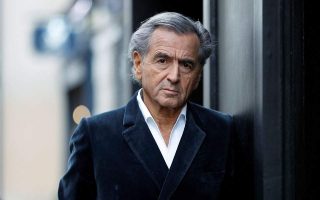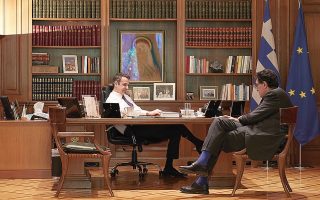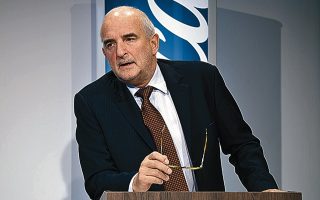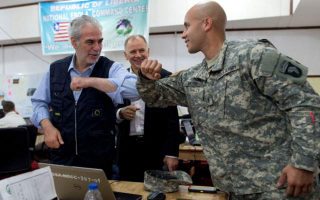EU ‘must now act boldly,’ says Nicholas Burns
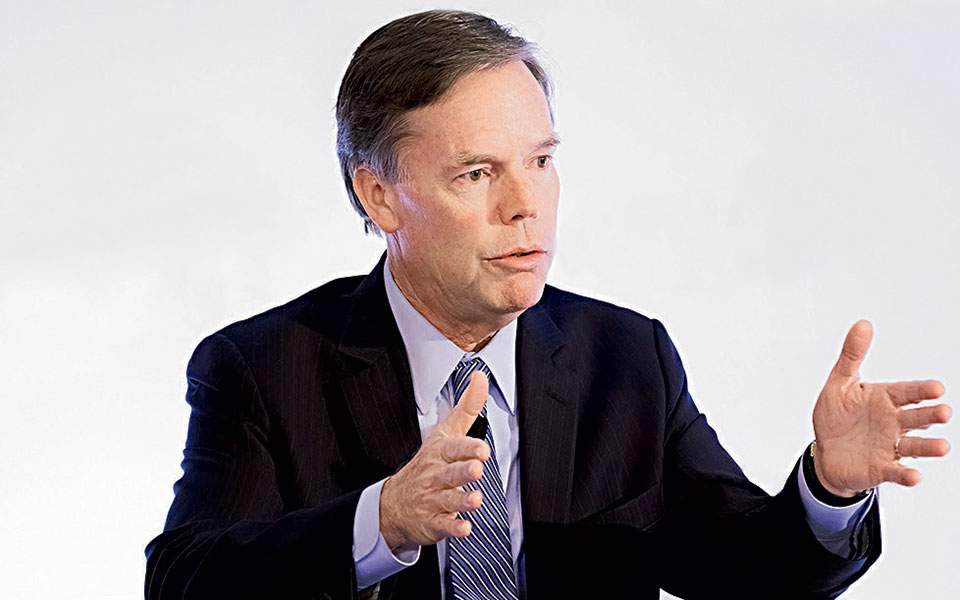
Nicholas Burns, an old friend of Greece and well known in the country having served as US ambassador in Athens between 1997 and 2001, is now professor of practice of diplomacy and international relations at the Harvard Kennedy School and an adviser to Joe Biden’s campaign for the White House. Burns also served as US ambassador to NATO (2001-05) and under secretary of state for political affairs (2005-08). A few days ago he talked to Kathimerini from his home in Boston about Greece’s remarkable performance in tackling the crisis, the challenges Europe and the US are facing, President Donald Trump and how the pandemic is influencing the global balance of power.
You know Greece pretty well. What is your opinion of the country’s handling of the crisis?
I realize that this pandemic has been an extremely difficult challenge for Greece, particularly as it coincides with the refugee crisis in the eastern Aegean islands. I admire Prime Minister Kyriakos Mitsotakis, however, and have confidence in his intelligence and leadership. In my view, the European Union must now act boldly to help its member-states like Greece through “corona bonds” or other initiatives.
Do you think this crisis is a “make or break” existential crisis for the European Union?
As a friend of Europe, it has been surprising to see how each of the European nations turned inward during the last month. In one sense, that is understandable as public health is a national responsibility in Europe. Governments had an obligation to save their own citizens first. The EU seemed to be on the sidelines during the first phase of the crisis. But it will be a critical actor in the second phase as economies are reopened. The EU must act decisively and, along with the European Central Bank, do whatever it takes to sustain the economies of the member-states.
Do you trust Donald Trump to lead America and the world out of the crisis?
President Trump has proven that he is incapable of strong, calm, decisive leadership. He has overly politicized the crisis here in the US. He has not been an effective global leader. He should be working much more closely with the EU, Germany, Greece, Japan, China, India and other leading nations to create a more successful global response.
How do you feel personally that you suddenly have to live under uncertainty and restrictions? Has a new “dark age” descended upon us?
Like several billion other people around the world, it has been an extraordinarily challenging experience for my wife and I to be in a lockdown for three weeks now. Like you, we worry about our children and grandchildren, other family members and friends. This crisis is one of the first in human history to affect every person on earth. All of us feel a sense of personal and collective vulnerability. All of us, in Greece and the US and nearly everywhere else, are facing perhaps the greatest challenge since World War II in the coronavirus pandemic and the global economic crisis. While it is difficult to know for sure at such an early stage, we may have to live with the pandemic until 2021 when, hopefully, a vaccine will be available for the world’s 7.7 billion people. This needn’t be a new dark age, however. If we can combine efforts globally and share resources, we can defeat the pandemic.
How has the coronavirus pandemic already affected the global balance of power? And what’s next?
Unfortunately, the world’s two strongest nations, the US and China, are competing with each other for which is doing more to help the world during the pandemic. China has accused the US of planting the virus in Wuhan. This is a grotesque lie. On the other hand, President Trump and Secretary of State [Mike] Pompeo have called it the “Wuhan” or “Chinese virus.” Frankly, both governments need to put aside their rivalry and work together to discover a vaccine, share data with the World Health Organization, help the poorer nations to cope with the crisis. In addition, President Trump and President Xi Jinping should work with the other G20 nations to collaborate on the first wave of the crisis and prepare for a possible second wave in the autumn or in early 2021. Too much is at stake for the US-China bickering to continue.
Is the liberal West – the United States and Europe – less well placed to defeat a pandemic because it cannot control populations and curtail liberal rights in the way China can?
China wants us to believe that only authoritarian governments can cope effectively with a pandemic. But that just isn’t true. South Korea, Taiwan, New Zealand, Austria, Denmark and the Czech Republic have all done better than most of their neighbors. All are democracies. In the US, our Pacific coast states – California, Oregon and Washington – all went into lockdown earlier than the other states and have lower infection rates and fewer deaths. Democracies can cope with public health crises. They just require good, rational leadership. In the US, our best leaders have been governors and mayors from both political parties. President Trump, on the other hand, has been erratic, unfocused and has linked the crisis far too closely to our presidential election and his own future. He has been a major disappointment.
Civilizations tend to collapse due to environmental and ecosystem changes. Is this an existential crisis for the West?
I agree that the entire world is facing an existential crisis in public health. In just two decades, we have experienced the SARS, H1N1 and Ebola pandemics before Covid-19. We have to expect another pandemic ahead in the next decade. We must thus be much better prepared to react to it the next time. That requires better and more focused global planning, funding and leadership. Climate change remains another profound existential challenge. I hope the US will rejoin the Paris Climate Change Accord. If Joe Biden wins our election (I am supporting him and am an adviser on his campaign), he will treat climate change as a priority and return us to working with the rest of the world.
Inequality was already skyrocketing before the pandemic. Do you worry?
I do worry about our ability globally to resolve both the pandemic and the world economic crisis at the same time. As the first wave of the pandemic passes through Europe and North America, we will have to begin to reopen our economies. But, this will be a difficult balancing act given the uncertainty about testing, immunities and which people are able to return to work and which cannot.
Post-war leadership in science and technology is what really made America great. Is there strong evidence to suggest that technology will again save the day?
I do think America’s vast strength in science and digital age technologies should help to resolve this pandemic and to prepare for future pandemics. America’s global strength rests in large part on our economy and great research universities and tech companies. The federal government needs to expand significantly research and development funding for universities like Harvard and with the private sector. A final point: Despite the harrowing challenges we all face around the world at this extraordinary moment, we can find inspiration and courage in our doctors, nurses, hospital workers and public servants. They inspire me as I watch them (including my brother and two nieces who are all doctors in Boston hospitals) on the front lines fighting for all of us. Human beings are resilient. If we stick together inside our countries and also globally, we will emerge from the crisis to rebuild a better world in the future.
